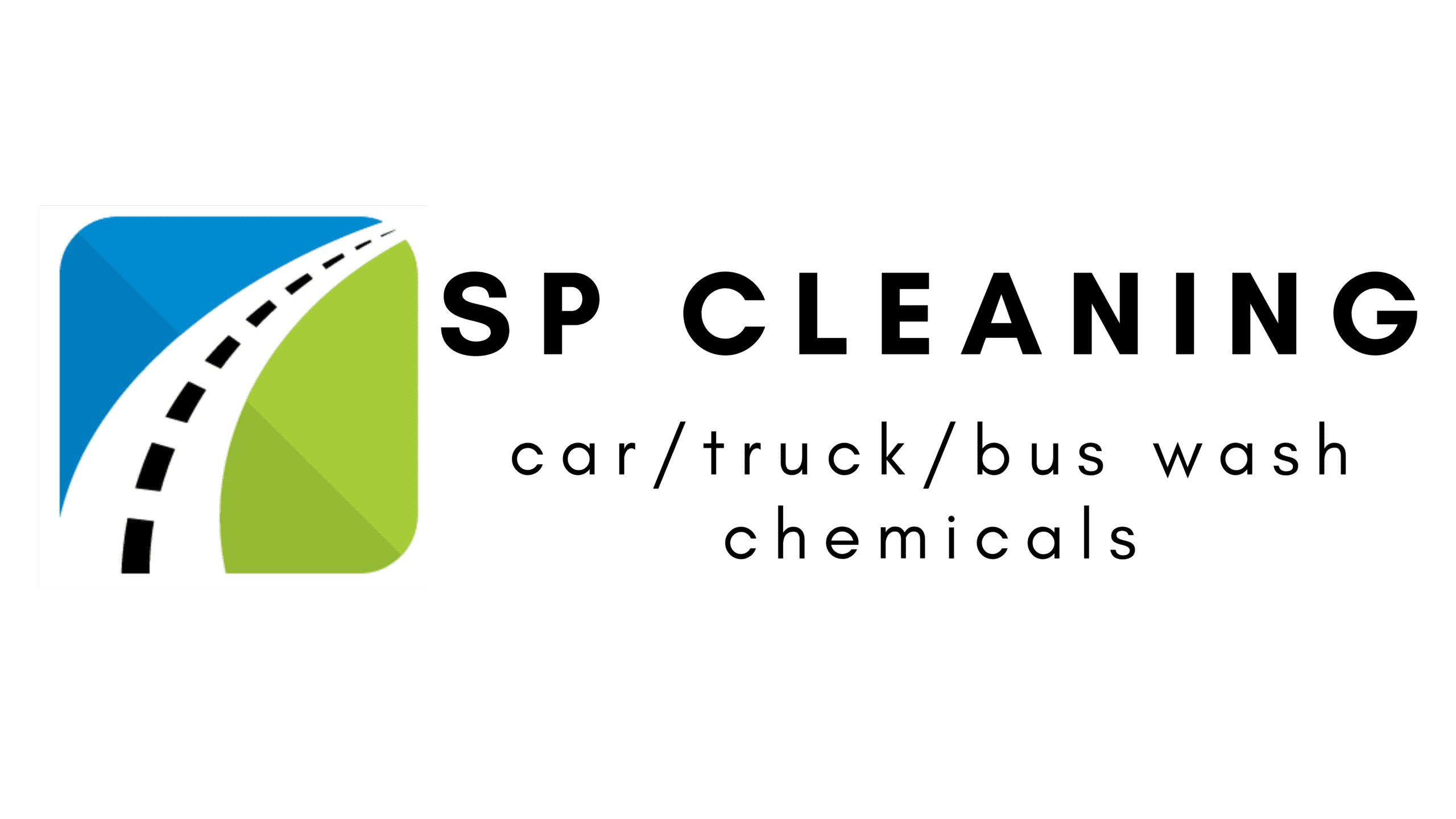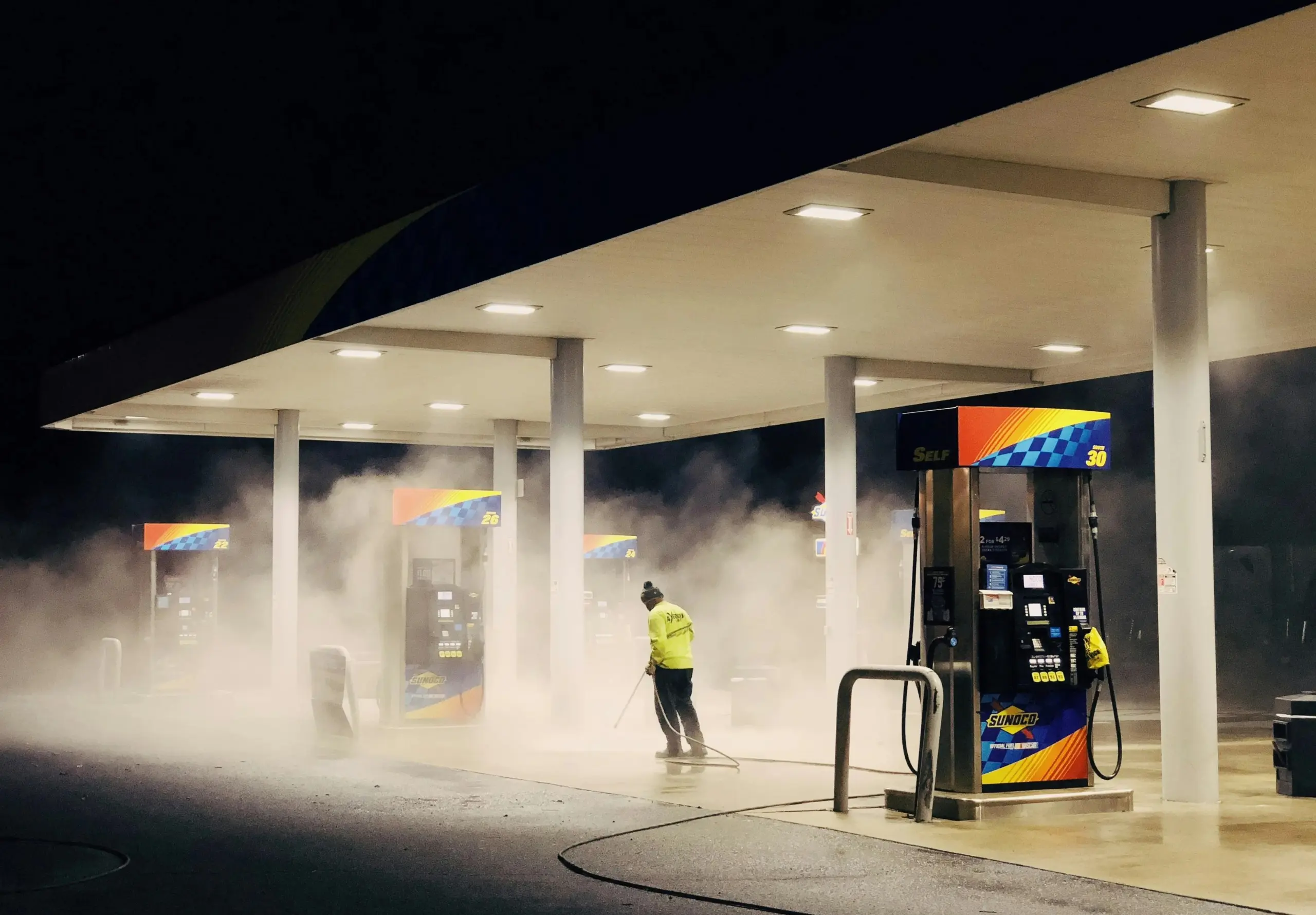Keeping your vehicles looking great is easy with a good pressure wash.
But not all cleaners are the same.
SP Cleaning has special pressure washing chemicals that can handle tough dirt on your car, truck, or SUV, making SP Cleaning as best pressure washing soap.
Whether it’s road salt, mud, or dust, our pressure washing chemical formulas clean deeply without hurting the paint. Try SP Cleaning’s products for the best results and see why they’re perfect for people who love their vehicles.
Key Takeaways
- Choose a soap made for your specific pressure washer to avoid damage.
- SP Cleaning soaps are popular for their effectiveness and safety.
- Match the soap type to the surface you’re cleaning for best results.
- Always follow the manufacturer’s guidelines for soap use.
- Test a small area first to ensure no damage or discoloration.
- Proper application techniques enhance cleaning efficiency and save time.
1. Understanding Pressure Washing Soaps
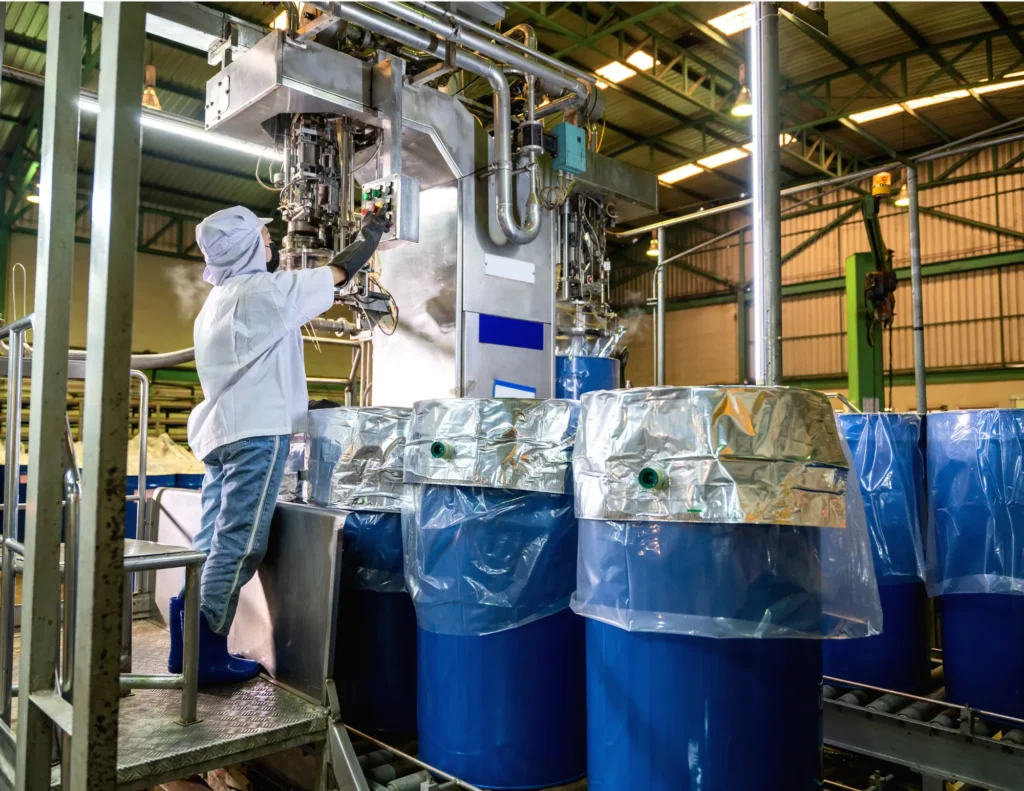
1. Types of Pressure Washing Soaps
Pressure-washing soaps come in many types. Some are made for wood, metal, or vinyl. Using the right soap for each surface helps clean better without causing damage.
There are also biodegradable and non-biodegradable options. Biodegradable soaps break down naturally without harming the environment.
Non-biodegradable ones might be more powerful but can be less eco-friendly.
Pressure Washing Soaps are specially made for certain tasks. For example, there are bulk cleaning chemicals like soaps to remove grease or mildew. These specialized soaps make cleaning easier and faster.
2. Benefits of Using Specialized Soaps
Specialized soaps offer several benefits. They improve cleaning efficiency by matching the soap to the surface. This means new pressure washer owners can achieve better results with less effort. Eco-friendly soaps minimize environmental impact. They use ingredients that do not harm nature.
Using the right soap also protects surfaces from damage. For example, using a soap designed for wood prevents it from getting damaged during cleaning.
3. Key Ingredients to Consider
When choosing a pressure-washing soap, look for certain ingredients. Biodegradable components ensure safety for plants and wildlife. Surfactants help remove dirt and grime effectively. They make it easier to rinse away stubborn stains.
Avoid harsh chemicals that can harm surfaces or the environment. These chemicals might clean well but can cause long-term damage.
2. SP Cleaning Pressure Washing Soaps
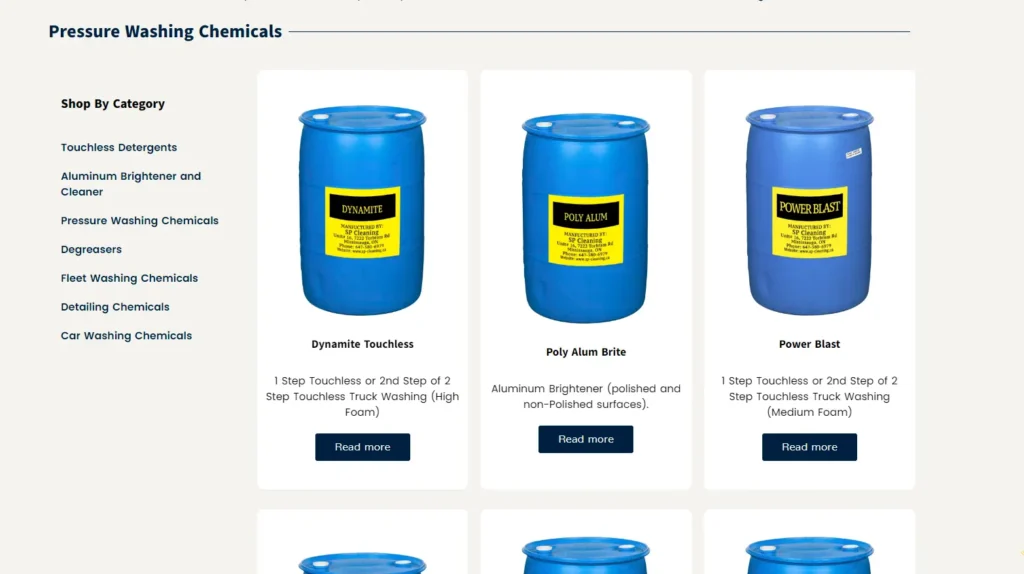
1. Dynamite Touchless Soap Features
Dynamite Touchless Soap is great for cleaning without scrubbing. It saves time and effort. It’s perfect for vehicles and delicate surfaces. Many pressure washer models work well with it. Its touchless formula makes washing easier.
2. Poly Alum Brite for Aluminum
Poly Alum Brite restores shine to aluminum surfaces. It’s safe for unpolished aluminum. This soap removes oxidation and stains effectively. Keeping aluminum bright is simple with this product.
3. Power Blast Medium Foam Soap
Power Blast creates medium foam for thorough cleaning. It works on many surfaces, making it versatile. The soap lifts dirt without leaving residue behind. Cleaning is efficient with its medium foam action.
4. Super Alum for Unpolished Surfaces
Super Alum has a special formula for unpolished metals. It removes tough stains and oxidation easily. Its gentle action prevents surface damage, keeping metals safe. Cleaning unpolished surfaces is hassle-free with this soap.
3. Choosing the Right Soap
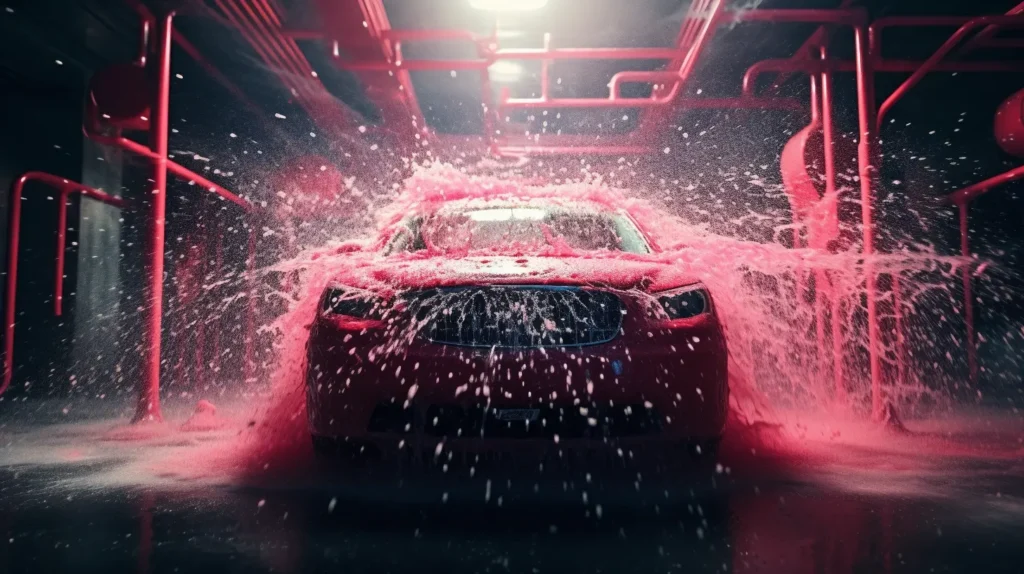
1. Consider Usage Purpose
Think about what you need to clean before picking a soap. Some soaps are made for specific tasks, like removing mud or grime. It’s important to match the soap’s formulation with the surface type and how dirty it is. If you want a shiny finish, choose a soap that offers a wax effect. For deep cleaning, look for stronger detergents.
2. Evaluate Water Type and Temperature
Water type matters when choosing soap. Hard water can affect how well soap works. You should check if your water is hard and pick a compatible soap. The temperature of the water also plays a role. Hot water might work better with certain soaps, while cold water might require different ones. Understanding these conditions can help you get the best results.
3. Concentrated vs. Diluted Options
Concentrated soaps can be more cost-effective. They let you mix your own solutions, which gives flexibility. You can adjust the strength based on your needs. On the other hand, pre-diluted options are convenient for quick use. They save time since they are ready to go right away.
4. Application Tips for Best Results
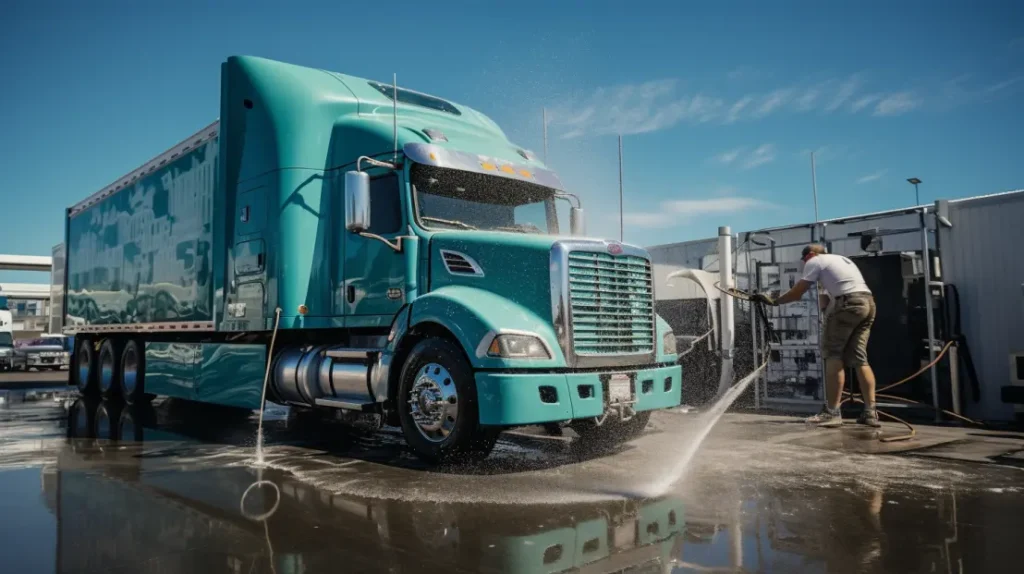
1. Proper Soap Dilution Techniques
Follow manufacturer guidelines for optimal dilution ratios. Each soap has specific instructions. These ensure the best cleaning results. Use measuring tools for accurate soap-to-water ratios. A measuring cup or spoon works well. This helps in achieving the right mix.
Test diluted solutions on small areas to ensure effectiveness. Try it on a hidden spot first. This will show if the solution does a great job without damage.
2. Ideal Conditions for Washing
Choose mild weather conditions to prevent soap from drying too quickly. Cloudy days are perfect. This allows more time for scrubbing without rushing. Avoid washing in direct sunlight to reduce streaking. Sun can cause unsightly marks.
Ensure surfaces are cool to the touch before applying soap. Hot surfaces can make soap dry too fast, leaving spots behind.
3. Safety Precautions to Follow
Wear protective gear, such as gloves and goggles, when handling soaps and be aware of chemicals not to mix. Some ingredients might irritate the skin or eyes. Keep soaps out of reach of children and pets. Curious hands and paws should stay safe.
Rinse surfaces thoroughly to prevent soap residue from causing harm. Leftover soap can damage paint or plants nearby. It is important to do a good job rinsing every corner.
5. Closing Thoughts
You know all about pressure-washing soaps, so let’s use that info!
The right soap helps clean your driveway or deck better.
It’s like picking the best tool for the job. Jump into pressure washing with confidence, trust your gut, and see your surfaces shine.
If you have questions, feel free to ask or look for more info. Let’s make cleaning easy and fun! Happy washing!
6. Frequently Asked Questions
1. What makes a pressure washing soap effective?
An effective pressure-washing soap cuts through grime like a hot knife through butter. It should be biodegradable, safe for surfaces, and easy to rinse off. Look for soaps with strong cleaning agents but gentle on your surfaces.
2. Can I use regular dish soap for pressure washing?
You could, but it’s like using a spoon to eat soup when you have a ladle. Regular dish soap isn’t formulated for pressure washers and might not clean as effectively. Plus, it could damage your equipment or leave residue behind.
3. How do I choose the right pressure-washing soap?
Think of it like choosing the right shoe for running. Consider the surface you’re cleaning—concrete, wood, or siding—and pick a soap designed for that material with tips to use pressure washing chemicals. Check labels for compatibility and eco-friendliness.
4. Are SP Cleaning Pressure Washing Soaps any good?
Absolutely! We are like the Swiss Army knife of pressure washing soaps—versatile and reliable, from a Canadian chemical manufacturer. They offer specialized formulas for different surfaces, ensuring you get sparkling results without harming your equipment or the environment.
5. How much soap should I use in my pressure washer?
Less is often more here. Follow the manufacturer’s instructions to avoid a sudsy mess. Typically, a small amount goes a long way, ensuring efficiency without wastage.
6. Can I mix different soaps together?
Mixing soaps is like mixing paints—it can lead to unexpected results, especially when you dilute chemicals. Stick to one type at a time to prevent chemical reactions that could harm surfaces or your pressure washer.
7. What are some tips for applying pressure-washing soap?
Start from the bottom up to avoid streaks, much like painting a wall. Let the soap dwell for a few minutes but don’t let it dry. Rinse thoroughly with clean water for best results.
